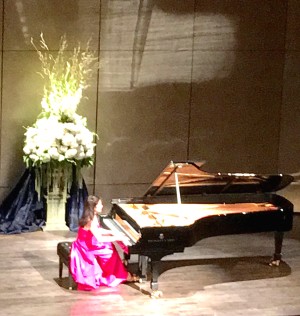Cecile Licad astounds in SF recital for PH Independence

World-renowned concert pianist Cecile Licad performing at Herbst Theatre in San Francisco. ESTHER MISA CHAVEZ
SAN FRANCISCO — World-renowned concert pianist Cecile Licad stunned a mostly Filipino American audience with an astonishing performance June 24 at Herbst Theatre of the San Francisco War Memorial Performance Arts Center, capping the commemoration of the 118th anniversary of Philippine independence.
After a welcome by Consul General Henry S. Bensurto, Jr., the pianist in a radiant fuchsia dress, entered the stage, approached the piano and proceeded to astound the audience with her superb musical skill and artistry.
Licad opened the recital with the sonorous low “C” octave of Frederic Chopin’s Ballade #1 in G minor (1835), a beloved piece to those familiar with the classical piano repertoire, and a crowd-pleaser in general for it’s romantic and lyrical melodies woven with rhapsodic passages and scintillating rhythms. Indeed, Licad astounded up to the end with the last ascending scale and bombastic octave work building up in accelerando in which the passages could not have accelerated in velocity any more than Licad played.
After a dazzling performance of Chopin, the iconic Polish composer of the Romantic era in the first half of the 19th century, Licad transported the audience to the music of Edward MacDowell, an American composer from the second half of the 19th century and composer of the popular, short but sweet and tender piano piece, “To a Wild Rose.” But there is nothing short about the MacDowell piece Licad selected.
Just like the road to Filipino independence was long and epic, so is the Piano Sonata No.1, Opus 45 in G minor. Also referred to as “Sonata Tragica,” the imposing, dramatic first notes of the Largo maestoso–Allegro risoluto, interspersed with cascading scales and octaves, immediately evoked a sense of immense tragedy only music can conjure.
Article continues after this advertisementIn the second movement, Molto allegro, vivace, Licad momentarily dissipated the tragic with lively and playful passages. The next movement, Largo con maestà, the deep sorrow and anguish returned with its slow, and at times quiet passages but always full of passion and sentiment. The last movement, Allegro eroico–Maestoso, opened with resolute chords and exploded in pianistic brilliance and majesty skillfully executed and interpreted by Licad.
Article continues after this advertisementThe second half of the program began with another quintessential European composer of the Romantic era, Franz Liszt (1811-1886). Licad played “Legend No.2: St. Francis of Paola Walking on the Waters.” Just as this piece relates the miraculous crossing of the Straits of Messina by the saint when, for looking insignificant, he is refused by boatmen to ride in their vessel, Licad’s performance of this technically demanding composition seemed to be also miraculous, although not surprising, given her accomplishments and talent.
In the next piece, Licad brought us back to the United States with the New Orleans-born Louis Moreau Gottschalk (1829-1869) and his “Three Spanish Pieces: La Jota Aragonesa, Manchega, Souvenirs d’Andalousie.” Gottschalk transported the listener to Northern Spain and to the South with rhythms, motifs, and melodies distinctly and undeniably Iberian. Licad brought such life to these pieces that one expected Spanish dancers to magically appear at any moment.
Since a Filipino event was being celebrated and the guest artist was Filipina, a recital would not be complete without a Filipino composer—Francisco Buencamino (1883-1952). Licad performed “Kumintang” and evoked the romantic Filipino soul with stunning musical showmanship.
The penultimate piece was “A Hermit Thrush at Evening, Opus 92, No.1” by the American composer Amy Beach (1867-1944). The artist’s selection, after an evening of dazzling musical bravado, brought the audience suddenly and unexpectedly to an oneiric musical dimension that was lush, enigmatic and wistful.
Then all at once, Licad awakened the audience from the previous musical dream to “Alborada del Gracioso” from “Miroirs” by the French composer Maurice Ravel (1875-1937) of “Bolero” fame. Although he was French, Ravel’s mother was Basque Spanish, thus explaining his affinity to Spain in his music. “Alborada del Gracioso” is infused with Spanish rhythms evoking castanets, Flamenco footwork, repeated notes from a guitar and dancers in a trance touched by duende, that mysterious, magical source of inspiration touching Flamenco performers and bringing them to phenomenal levels of performance and that will inspire an olé from the spectator.
Cecile Licad masterfully executed and interpreted the rhythms and attitudes of Ravel’s composition resulting in a pianistic tour de force, and undeniably with duende in her hands and soul, brought musical fire that enchanted and bewitched minds and hearts. ¡Olé!
